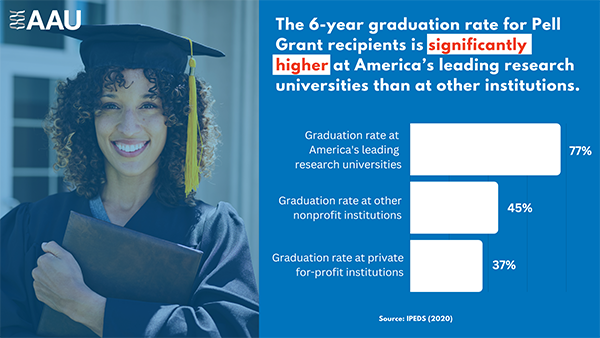 AAU President Urges Congress to Protect Dreamers
AAU President Urges Congress to Protect Dreamers
On Wednesday, the 5th U.S. Circuit Court of Appeals found that the Deferred Action for Childhood Arrivals (DACA) program is illegal. The program provides protection from deportation for nearly 600,000 college students and other young people who were brought to the United States as children through no fault of their own; DACA beneficiaries are sometimes referred to as “Dreamers.” The appeals court also ordered a lower federal court to quickly review and determine the legality of the new DACA regulation that was adopted by the Biden administration earlier this year. The ruling prohibits the Department of Homeland Security from granting initial DACA requests or accompanying requests for employment; DHS can, however, continue to grant renewal requests from existing DACA recipients.
AAU President Barbara R. Snyder issued a statement expressing disappointment at the circuit court’s “misguided ruling, which once again places the futures of more than half a million deserving college students and other young people in limbo.” She urged Congress to “rectify the Dreamers’ cruel and untenable predicament by creating a permanent solution” for DACA recipients. “We cannot afford to waste our home-grown talent in science and other fields, and a lack of congressional action to codify protections for Dreamers risks doing just that,” she said.
 ICYMI: Barbara’s Blog: Dreamers Face a Nightmare
ICYMI: Barbara’s Blog: Dreamers Face a Nightmare
 President Biden Issues Executive Order Promoting Arts and Humanities
President Biden Issues Executive Order Promoting Arts and Humanities
Last week, President Biden issued an executive order to promote Americans’ engagement with the arts, the humanities, and museum and library services. The executive order recognizes the crucial role the arts and the humanities play in advancing “the well-being, health, vitality, and democracy of our nation,” and notes that the administration will work to make it easier for Americans, especially those from underserved communities, to access all the benefits that a vibrant “creative and cultural economy” can offer.
The executive order notes that the administration will integrate the arts and the humanities into its “strategies, policies, and programs,” and create opportunities for individuals and institutions, including universities, that support creative and humanistic work. To this end, the executive order establishes a new President’s Committee on the Arts and the Humanities within the Institute of Museum and Library Services and directs the heads of executive departments and agencies to work with the National Endowment for the Arts, the National Endowment for the Humanities, and IMLS to undertake joint projects that advance the arts and the humanities.
President Biden also issued an accompanying proclamation declaring October 2022 as National Arts and Humanities Month.
 White House Releases Blueprint on AI Ethics and Safety
White House Releases Blueprint on AI Ethics and Safety
Earlier this week, the White House Office of Science and Technology Policy released a “Blueprint for an AI Bill of Rights” designed to protect the rights of the American public when it comes to the use of automated systems and artificial intelligence. Automated systems based on algorithms and machine learning are everywhere – from moderation tools on social media to facial recognition systems used by law enforcement to algorithms that detect student cheating or plagiarism, screen housing applicants, or scan résumés for hiring. The blueprint notes that, even though automated systems are now an integral part of our lives, too often these tools limit opportunities for people, come embedded with harmful biases that lead to discrimination, or undermine our privacy.
The blueprint lays out five principles related to the use of AI that could help protect the American people. The principles note that automated systems should be safe and effective, should not discriminate, should come with built-in data privacy protections, should make clear to humans interacting with them when they are being used, and should come with opt-out measures and provide a human alternative. The principles are non-binding but are intended to inform the work of government agencies, researchers, and technology companies as they build and further refine AI systems. The complete blueprint for an AI bill of rights is available on the White House website.
In an accompanying fact sheet, the White House also announced that, as part of its continued effort to advance tech accountability and to protect the public, the Department of Education will release “recommendations on the use of AI for teaching and learning by early 2023.” The White House noted that the recommendations will focus on the educational uses of AI and how it can be leveraged “to advance universal design for learning” and protections for students when using AI.
 New Report Assesses the United States’ International Science and Technology Cooperation Efforts
New Report Assesses the United States’ International Science and Technology Cooperation Efforts
The White House Office of Science and Technology Policy and the National Science and Technology Council recently published their biennial report to Congress on the United States’ international science and technology cooperation efforts. The report identifies areas where the United States excels in international science and technology (S&T) engagement and areas where the nation is losing competitiveness. The September report also provides recommendations “to firmly establish U.S. leadership” on the global stage.
The report finds that the United States excels in “annual overall R&D investment, research-driven efforts, setting global standards and norms, attracting and retaining STEM talent, and achieving diplomatic and national security goals with international S&T engagement.” The report notes, however, that the United States is “gradually losing ground” because of China’s increasing investments in research and development, and because of a paucity of flexible, long-term commitments to funding international collaborative science, especially “ambitious, large-scale” projects. In addition, the report says, certain immigration requirements as well as insufficient diversity in the STEM workforce may also be hampering U.S. competitiveness on the global stage.
News of Interest
The Baltimore Sun: Minority Students Make Up a Small Fraction of Those Who Hold STEM Doctorates. A New Johns Hopkins Program Aims to Change That – A new initiative at Johns Hopkins University is providing pathways for minority students from historically Black colleges and universities and minority-serving institutions to pursue STEM doctoral degrees at the prestigious university. The Vivien Thomas Scholars Initiative welcomed 20 doctoral students to Johns Hopkins this fall and will cover the scholars’ full tuition and provide other benefits and mentorship for up to six years.
ABC7 News: Stanford Professor Among 3 Chemists Awarded Nobel Prize for ‘Ingenious’ Molecule-Building Tool – Stanford University’s Carolyn R. Bertozzi has won the Nobel Prize for chemistry along with two others for advancing the science of “click chemistry” that enables chemists to link molecules together. Bertozzi said that the science is leading to the discovery of “new kinds of molecules” and helping patients receive targeted treatments for diseases such as cancer.
Science: NSF Hopes Big Data Will Finger Grantees Not Reporting Foreign Support – The National Science Foundation will soon start digging into databases of scientific publications to find scientists who received federal funding for their research but did not disclose ties to foreign institutions in their grant applications. The effort is meant to comply with the recently passed CHIPS and Science Act, which contains several measures aimed at preventing foreign entities from stealing federally funded research.
Inside Higher Ed: Voter Groups Worry About Access for Students – Advocacy groups and colleges are working together to register students to vote and to increase student turnout on election day. But they must overcome new measures passed by states across the country to limit voting access as well as students’ skepticism that their vote matters in today’s polarized political climate.
The Hill: Lawsuits, Shrunk Eligibility Take the Shine Off Biden’s Student Debt Relief – In the past few days, the Biden administration’s student loan forgiveness program has been hit with legal challenges as well as a tough score from the Congressional Budget Office, which estimated that the program would cost $400 billion. The administration also abruptly announced that federal student loans held by private lenders will no longer be eligible for the program.
Inside Higher Ed: Students Say COVID-19 Aid Improved Grades, Relieved Stress – A new report has found that emergency COVID-19 aid from the federal government’s Higher Education Emergency Relief Fund “helped college students stay enrolled in classes, provided stress relief and improved academic outcomes.”
Featured Research

How Climate Change Impacts Fall Foliage
A research scientist at Columbia University has observed several effects of a changing climate on fall foliage. As temperatures get warmer, trees are holding on to their green leaves longer than usual. But, because the trees are still dropping their leaves at the same time as before, the duration of peak fall colors has shortened. Finally, variations in precipitation are also affecting the quality of fall foliage colors.

Recreating “Ghost Neighborhoods” Destroyed by Highways
In the mid-1960s, construction of interstate highways divided and destroyed many communities of color across the United States. Now a team of researchers at The Ohio State University are creating 3-D visualizations to recreate the lost neighborhoods. The researchers hope their project will help cities make decisions about eliminating highways or “mitigating the harms they are causing.”
Stat of the Week

Pell Grant Recipients Graduate at Higher Rates at AAU Institutions
Undergraduates at America’s leading research universities are more likely to complete their bachelor’s degrees on time than undergraduates at other four-year nonprofit or for-profit universities. The high completion rate also holds true for Pell Grant recipients. According to Department of Education data, 77% of Pell Grant recipients who start at AAU institutions graduate within six years, compared to only 45% of Pell students at other four-year nonprofit institutions and 37% at for-profit universities.